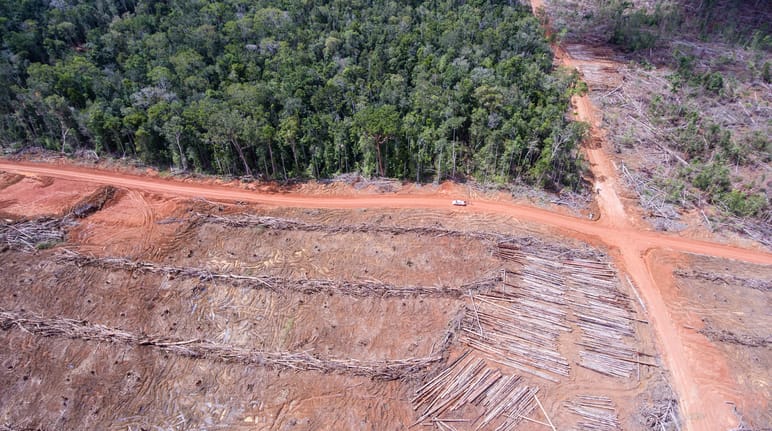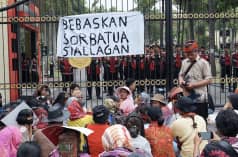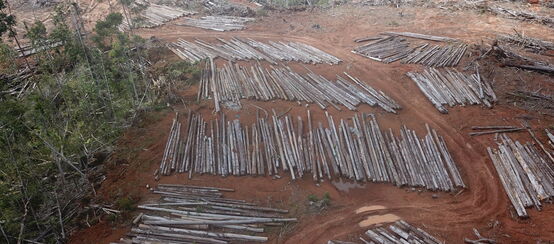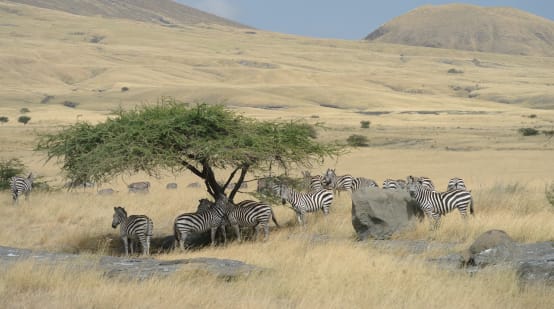Samsung, get out of Papua’s rainforests!
 Clearing forest in Merauke, Papua, Indonesia (© Mighty)
Clearing forest in Merauke, Papua, Indonesia (© Mighty)
Smartphones are not the only things going up in flames in the Samsung business empire: the group recently launched a joint venture with Korindo, a palm oil company notorious for slashing and burning Papua’s rainforests.
News and updates Call to actionTo: Chairman and CEO Boo-Keun Yoon, Vice Chairman and CEO Oh-Hyun Kwon, CEO Germany Sun-Woo Lee
“Samsung’s partner Korindo is destroying pristine rainforest in Papua. Samsung must drop its business relationship with Korindo immediately!”
Papua is a land of ancient forests with tree kangaroos, cassowaries and birds of paradise, snow-capped peaks, crystal-clear lakes and the most beautiful beaches in the world: “It's as close to the Garden of Eden as you’re going to find on Earth,” said Conservation International ornithologist Bruce Beehler in 2006.
How things have changed: since 2010, hundreds of thousands of hectares have been cleared for plantations as part of the MIFEE mega-project in Merauke district in southeastern Papua. The Korindo Group is the worst forest destroyer in the region. The company has slashed and burned more than 50,000 hectares of pristine forest in Papua, the Maluku Islands and Borneo.
A former Korean Korindo employee spoke to the newspaper Korea Exposé on the condition of anonymity and explained how corporations systematically cheat Papuans out of their traditional land by making extravagant promises with no intention of following through. Franky Samperante, founder of Pusaka Indonesia, an indigenous people’s organization, echoed the anonymous whistleblower's assertions that Korindo had broken promises of “prosperity, economic empowerment, employment, educational facilities, profit sharing and so on.”
Once Korindo moves in, the Garden of Eden that ornithologist Beehler loves so much goes up in flames. Slashing and burning forest to make way for oil palms is an everyday occurrence on Korindo concessions, as documented by an aidenvironment study.
While numerous other companies have distanced themselves from Korindo, Samsung is bucking the trend by establishing a joint venture with the group – an unholy alliance for human rights violations and rainforest destruction.
Tell Samsung to end its complicity in an ecological disaster and drop its relations with Korindo NOW!
BackgroundPapua is an Indonesian province on the island of New Guinea, not to be confused with the independent state of Papua New Guinea (PNG) to the east.
Photo gallery: Korindo destroying the forests and livelihoods of indigenous Papuans
Following the publication of Burning Paradise: Palm Oil in the Land of the Tree Kangaroo, a report on Korindo’s rainforest destruction and human rights violations, numerous partners ended their business relationships with the group. Wilmar, Musim Mas and other clients no longer buy Korindo palm oil, the APRIL (Paper One) paper group did not extend its contract for Korindo pulp, and Siemens, a buyer of Korindo wind towers, is also deciding on further action. Korindo’s FSC certification is currently being reviewed.
Just as Korindo is being shunned by the rest of the business world, Samsung is entering into a joint venture with the group. Samsung is thus sending a signal that Korindo can continue destroying rainforest and trampling the rights of indigenous people!
In its Interim Report on Negative Human Rights Impact, Korean Transnational Corporations Watch uncovered human rights violations by Samsung and other Korean corporations. IT vendor Samsung SDS has its own plantations in Indonesia, in a partnership with the notorious Ganda Group (renamed Gama Group) in Riau province on Sumatra. The Ganda Group is an old acquaintance of Rainforest Rescue: Wilmar, Asia’s leading largest agribusiness group, “resolved” its issues with indigenous peoples by selling a conflict plantation to the Ganda Group, thus delegating the human rights violations while buying the plantation’s palm oil from Ganda.
To: Chairman and CEO Boo-Keun Yoon, Vice Chairman and CEO Oh-Hyun Kwon, CEO Germany Sun-Woo Lee
Gentlemen,
Your subsidiary, Samsung SDS, entered into a joint venture with the Korindo Group in June 2017. Korindo is notorious for its large-scale rainforest destruction and disregard for the rights of indigenous peoples. The group is destroying primary forest in the districts of Merauke and Boven Digul in the Indonesian province of Papua. Maintaining this forest is crucial to the survival of indigenous Papuan cultures, biodiversity and the global climate.
Please end your business relationship with Korindo. Samsung customers want to be certain that your products are not connected with environmental crimes or human rights violations in any way. I also urge you to implement a transparent and unambiguous human rights policy for your own companies, subcontractors and suppliers.
Sincerely,
The issue – rainforest on our dinner tables and in our fuel tanks
At 66 million tons annually, palm oil is the most commonly produced vegetable oil. Its low world market price and properties that lend themselves to processed foods have led the food industry to use it in half of all supermarket products. Palm oil can be found in frozen pizzas, biscuits and margarine, as well as body creams, soaps, makeup, candles and detergents.
Few people realize that almost half of the palm oil imported into the EU is used as biofuel. Since 2009, the mandatory blending of biofuels into motor vehicle fuels has been a major cause of deforestation.
Oil palm plantations currently cover more than 27 million hectares of the Earth’s surface. Forests and human settlements have been destroyed and replaced by “green deserts” containing virtually no biodiversity on an area the size of New Zealand.
The impact – suffering and death in producer countries, climate havoc
The warm, humid climate of the tropics offers perfect growth conditions for oil palms. Day after day, huge tracts of rainforest in Southeast Asia, Latin America and Africa are being bulldozed or torched to make room for more plantations, releasing vast amounts of carbon into the atmosphere. As a consequence, Indonesia – the world’s largest producer of palm oil – temporarily surpassed the United States in terms of greenhouse gas emissions in 2015. With their CO2 and methane emissions, palm oil-based biofuels actually have three times the climate impact of traditional fossil fuels.
Palm oil is not only bad for the climate: As their forest habitat is cleared, endangered species such as the orangutan, Borneo elephant and Sumatran tiger are being pushed closer to extinction. Smallholders and indigenous people who have inhabited and protected the forest for generations are often brutally driven from their land. In Indonesia, more than 700 land conflicts are related to the palm oil industry. Human rights violations are everyday occurrences, even on supposedly “sustainable” and “organic” plantations.
As consumers, we are largely unaware of these broader issues, yet our daily palm oil consumption also impacts our health: refined palm oil contains large amounts of harmful fatty acid esters that are known to damage DNA and cause cancer.
The solution – a revolution on our dinner tables and in our fuel tanks
Only 70,000 orangutans still roam the forests of Southeast Asia, yet the EU’s biofuels policy is pushing them to the brink of extinction. Every new plantation on Borneo is destroying a further piece of their habitat. Stepping up the pressure on policymakers is a must if we want to save our tree-dwelling kin. Apart from that, however, there is still a lot we can do in day-to-day life.
Follow these simple tips to recognize, avoid and combat palm oil:
- Enjoy a home-cooked meal: Use your imagination: why not try almond-coconut-pear biscuits? Or pizza with potato and rosemary? A meal cooked from fresh ingredients beats processed foods containing palm oil every time. Oils such as sunflower, olive, rapeseed or flaxseed are ideal for cooking and baking.
- Read labels: As of December 2014, labeling regulations in the EU require food products to clearly indicate that they contain palm oil. However, in the case of non-food items such as cosmetics and cleaning products, a wide range of chemical names may still be used to hide the use of palm oil. A quick check of your favorite search engine will turn up palm oil-free alternatives, however.
- Remember that the customer is king: Ask your retailers for palm oil-free products. Write product manufacturers and ask them why they aren’t using domestic oils. Companies can be quite sensitive to issues that give their products a bad name, so inquiring with sales staff and contacting manufacturers can make a real difference. Public pressure and increased awareness of the problem have already prompted some producers to stop using palm oil.
- Sign petitions and write your elected representatives: Online campaigns put pressure on policymakers responsible for biofuels and palm oil imports. Have you already signed all of Rainforest Rescue’s petitions?
- Speak out: Protest marches and creative action on the street raise public and media awareness of the issue, which in turn steps up the pressure on policymakers.
- Leave your car at home: Whenever you can, walk, ride a bicycle or use public transport.
- Be informed and inform others: Big Business and governments would like us to believe that biofuels are good for the climate and that oil palm plantations are sustainable. Spread the word – share this information with your family and friends and encourage them to rethink their consumption habits. It’s in our hands!














 Recent successes
Recent successes